三级公共英语语法重点
2023年大学英语三级语法知识总结汇总

三级语法考点归纳一.虚拟语气1.i.句中虚拟形式if 引导的非真实条件句(纯粹假设或发生的也许性不大):条件从句主句与现在相反did (be were) would/ should/ might/ could do与将来相反did (be were) would/ should/ might/ could do与过去相反had done would/ should/ might/ could have done例句If we left (leave) now, we should arrive in time.If they hadn’t gone on vacation, their house wouldn’t have been broken (break) into.2.原形虚拟:a.表命令、决定、规定、建议等词语之后的that-分句中,用动词原形。
suggest, demand, advise, propose, order, arrange, insist, command, require, request, desire …… that +(should) do例如He suggested that we should leave early.My suggestion is that we should tell him.b.I.i.(was.形容词/名词tha.….(should.do/例如It is absolutely essential that all the facts be examined first.3.一些句型中的虚拟形式:1.It’.(high.about.th.first.etc..tim.(that.…动词过去时.例.It’.tim.w.left..例.I.i.tim.w.wen.t.bed.2 would rather/sooner 宁愿as if/ though 仿佛would rather/sooner 谓语用过去时与现在或者将来相反as if/ though 谓语用过去完毕时与过去相反4.练习1..______.tr.i.agai.i.I_______you.A.will.a......B.should.a....C.would.wer...D.would.ha.been2.I.i.______.no.fo.th.water.th.plant._______live.A.were.woul.no..B.is.coul.no...C.were.coul...D.did.coul.not3.I.. ______.tha.chanc.t.sho.m.ability.._______th.presiden.o.thi.school.A.hav.no.had.coul.no.become ..B.ha.no.had.woul.no.hav.becom.C.di.no.have.coul.no.become ..D.doesn’.have.wil.no.become4.H.______.b.tha.burgla.i.yo.______.t.sav.him.A.migh.hav.bee.killed.hadn’.com...B.wil.b.killed.didn’.comeC.ma.b.killed.did’.com.......D.coul.b.killed.haven’.come5.I.i._______fo.you.help.._______tha.har.tim.wit.s.littl.money.A.wer.not.woul.no.spen........B.i.not.ca.no.spendC.ha.no.been.woul.no.hav.spen....D.hav.no.been.wil.no.spend6.Wher.______.yo.g.i.wa._______?A.will.break.ou............B.do.wil.brea.outC.would.wer.t.brea.ou........D.will.i.t.brea.out7.Sh.wishe.sh.______.tha.humiliatin.thing.A.doesn’.d....B.didn’.d.....C.haven’.don..D.hadn’.done8.Th.chairma.suggeste.tha.th.meetin.______.pu.off.A.ca.b.....B.b......C.i.......D.wil.be9.I.i.vita.tha.h.______.immediately.A.shoul.g...B.mus.g....C.goe......D.wen.10.I.i.tim.w._______d.ou.homework.A.begi.t....B.ca.begi.t..C.bega.t....D.wil.begi.to答案:1.选C。
英语三级必背知识点

英语三级必背知识点1. 时态和语态:- 当前时态:一般现在时(Simple Present)、现在进行时(Present Continuous)- 过去时态:一般过去时(Simple Past)、过去进行时(Past Continuous)、过去完成时(Past Perfect)- 将来时态:一般将来时(Simple Future)、将来进行时(Future Continuous)、将来完成时(Future Perfect)- 语态:被动语态(Passive Voice)2. 名词:- 可数名词和不可数名词- 单数和复数形式的变化- 特殊名词的变化,如不规则复数- 可数名词的限定词(定冠词、不定冠词、数词、形容词性物主代词等)3. 代词:- 主格代词和宾格代词- 物主代词和反身代词的变化- 指示代词、疑问代词和不定代词的用法、变化和区别4. 形容词和副词:- 形容词的基本用法和比较级、最高级的变化及用法- 副词的作用、位置和用法5. 动词及动词短语:- 动词的时态、语态和形式变化- 动词短语的构成和用法,如动词+副词、动词+介词短语等6. 介词:- 常用介词的基本用法、位置和搭配- 表示时间、地点、方式、原因等不同含义的介词7. 连词:- 并列连词、从属连词和关联连词的用法及区别- 连词短语和从句的构成和用法8. 冠词:- 定冠词和不定冠词的基本用法和区别- 冠词的特殊用法,如序数词、最高级前的用法等9. 数词:- 基数词和序数词的用法和变化- 分数、小数、百分数的表达10. 句子结构:- 主谓结构、主谓宾结构、主谓表结构等基本句型- 特殊句型,如祈使句、感叹句、倒装句等11. 陈述句、疑问句、否定句、祈使句的构成和用法12. 定语从句和状语从句的基本用法和连接词的选择13. 直接引语和间接引语的变化和转换14. 复合句的标点符号和连接词的运用15. 重要的语法规则和常见的错误用法,如动词时态和语态的混淆、形容词和副词的混淆、代词和名词的混淆等。
最新大学英语三级语法知识总结汇总
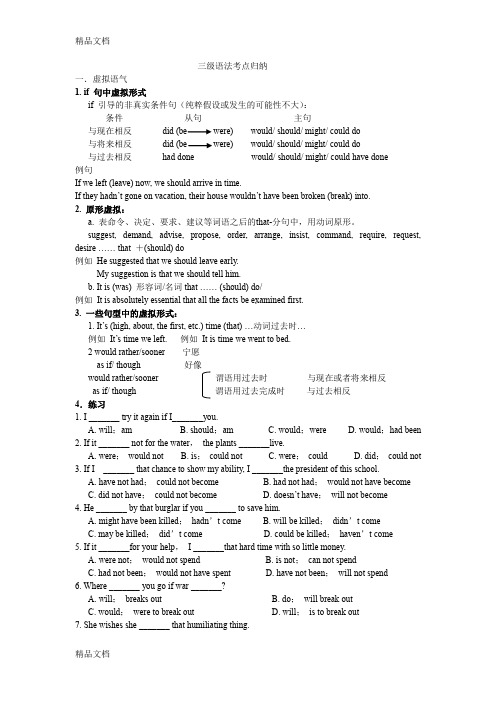
三级语法考点归纳一.虚拟语气1. if 句中虚拟形式if 引导的非真实条件句(纯粹假设或发生的可能性不大):条件从句主句与现在相反did (be were) would/ should/ might/ could do与将来相反did (be were) would/ should/ might/ could do与过去相反had done would/ should/ might/ could have done例句If we left (leave) now, we should arrive in time.If they hadn’t gone on vacation, their house wouldn’t have been broken (break) into.2. 原形虚拟:a. 表命令、决定、要求、建议等词语之后的that-分句中,用动词原形。
suggest, demand, advise, propose, order, arrange, insist, command, require, request, desire …… that +(should) do例如He suggested that we should leave early.My suggestion is that we should tell him.b. It is (was) 形容词/名词that …… (should) do/例如It is absolutely essential that all the facts be examined first.3. 一些句型中的虚拟形式:1. It’s (high, about, the first, etc.) time (that) …动词过去时…例如It’s time we left.例如It is time we went to bed.2 would rather/sooner 宁愿as if/ though 好像would rather/sooner 谓语用过去时与现在或者将来相反as if/ though 谓语用过去完成时与过去相反4.练习1. I _______ try it again if I_______you.A. will;amB. should;amC. would;wereD. would;had been2. If it _______ not for the water,the plants _______live.A. were;would notB. is;could notC. were;couldD. did;could not3. If I _______ that chance to show my ability, I _______the president of this school.A. have not had;could not becomeB. had not had;would not have becomeC. did not have;could not becomeD. doesn’t have;will not become4. He _______ by that burglar if you _______ to save him.A. might have been killed;hadn’t comeB. will be killed;didn’t comeC. may be killed;did’t comeD. could be killed;haven’t come5. If it _______for your help,I _______that hard time with so little money.A. were not;would not spendB. is not;can not spendC. had not been;would not have spentD. have not been;will not spend6. Where _______ you go if war _______?A. will;breaks outB. do;will break outC. would;were to break outD. will;is to break out7. She wishes she _______ that humiliating thing.A. doesn’t doB. didn’t doC. haven’t doneD. hadn’t done8. The chairman suggested that the meeting _______ put off.A. can beB. beC. isD. will be9. It is vital that he _______ immediately.A. should goB. must goC. goesD. went10. It is time we _______do our homework.A. begin toB. can begin toC. began toD. will begin to答案:1.选C。
成人英语三级考试英语语法常考句型(必背)资料

成人英语三级考试英语语法常考句型(必背)成人英语三级考试:英语语法常考句型(1)主语+不及物动词+现在分词/过去分词说明:1.本句型中的谓语动词由不及物动词充当,分词作状语。
2.现在分词短语作状语时通常表示主语正在进行的另一个动作,起陪衬或修饰作用。
3.过去分词(短语)作状语时,主要修饰谓语动词,表示动作发生的背景与情况。
4.现在分词/过去分词(短语)作状语时,其逻辑主语与句子是一致的。
例:a)They sat facing each other.他们面对面地坐着。
b)He lay on the grass enjoying the sunshine.他躺在草地上享受阳光。
c)Frustrated, he went back to his home village.他大失所望,回到家乡去。
d)Supported by the people, our troops struck back with guns and grenades.在人民的支持下,我军以步枪和手榴弹进行了反击。
(2)主语+及物动词+动词不定式说明:1.本句型中宾语由动词不定式充当。
2.本句型中的动词不定式可用被动式和完成式。
3.本句型中的动词不定式可在to前加not或never表示否定。
4.可接动词不定式作宾语的动词主要有:expect, hope, want, wish,apply, ask, manage, arrage, prepare, agree, promise, trouble, hilp,decline, choose, fail等。
例:a)He would admire to be a pilot.他喜欢当飞行员。
b)The scientist claims to have discovered a new planet.这位科学家宣称发现了一颗新的行星。
c)They pretended not to see us.他们佯装没有看见我们。
公共英语三级pets3干货 英语语法汇总
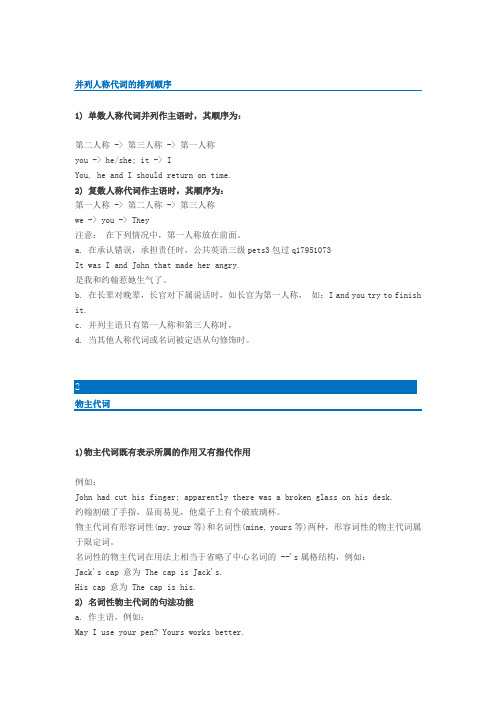
并列人称代词的排列顺序1) 单数人称代词并列作主语时,其顺序为:第二人称 -> 第三人称 -> 第一人称you -> he/she; it -> IYou, he and I should return on time.2) 复数人称代词作主语时,其顺序为:第一人称 -> 第二人称 -> 第三人称we -> you -> They注意:在下列情况中,第一人称放在前面。
a. 在承认错误,承担责任时,公共英语三级pets3包过q17951073It was I and John that made her angry.是我和约翰惹她生气了。
b. 在长辈对晚辈,长官对下属说话时,如长官为第一人称,如:I and you try to finish it.c. 并列主语只有第一人称和第三人称时,d. 当其他人称代词或名词被定语从句修饰时。
2物主代词1)物主代词既有表示所属的作用又有指代作用例如:John had cut his finger; apparently there was a broken glass on his desk.约翰割破了手指,显而易见,他桌子上有个破玻璃杯。
物主代词有形容词性(my, your等)和名词性(mine, yours等)两种,形容词性的物主代词属于限定词。
名词性的物主代词在用法上相当于省略了中心名词的 --'s属格结构,例如:Jack's cap 意为 The cap is Jack's.His cap 意为 The cap is his.2) 名词性物主代词的句法功能a. 作主语,例如:May I use your pen? Yours works better.我可以用一用你的钢笔吗? 你的比我的好用。
b. 作宾语,例如:I love my motherland as much as you love yours.我爱我的祖国就像你爱你的祖国一样深。
公共英语三级知识点
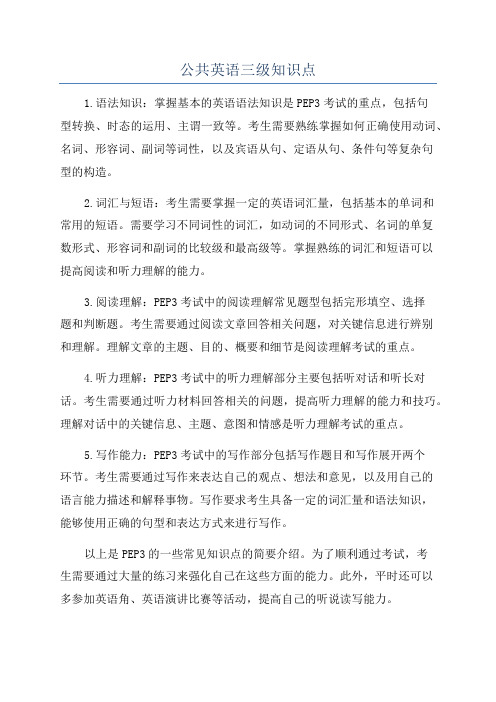
公共英语三级知识点
1.语法知识:掌握基本的英语语法知识是PEP3考试的重点,包括句
型转换、时态的运用、主谓一致等。
考生需要熟练掌握如何正确使用动词、名词、形容词、副词等词性,以及宾语从句、定语从句、条件句等复杂句
型的构造。
2.词汇与短语:考生需要掌握一定的英语词汇量,包括基本的单词和
常用的短语。
需要学习不同词性的词汇,如动词的不同形式、名词的单复
数形式、形容词和副词的比较级和最高级等。
掌握熟练的词汇和短语可以
提高阅读和听力理解的能力。
3.阅读理解:PEP3考试中的阅读理解常见题型包括完形填空、选择
题和判断题。
考生需要通过阅读文章回答相关问题,对关键信息进行辨别
和理解。
理解文章的主题、目的、概要和细节是阅读理解考试的重点。
4.听力理解:PEP3考试中的听力理解部分主要包括听对话和听长对话。
考生需要通过听力材料回答相关的问题,提高听力理解的能力和技巧。
理解对话中的关键信息、主题、意图和情感是听力理解考试的重点。
5.写作能力:PEP3考试中的写作部分包括写作题目和写作展开两个
环节。
考生需要通过写作来表达自己的观点、想法和意见,以及用自己的
语言能力描述和解释事物。
写作要求考生具备一定的词汇量和语法知识,
能够使用正确的句型和表达方式来进行写作。
以上是PEP3的一些常见知识点的简要介绍。
为了顺利通过考试,考
生需要通过大量的练习来强化自己在这些方面的能力。
此外,平时还可以
多参加英语角、英语演讲比赛等活动,提高自己的听说读写能力。
英语三级知识点范文
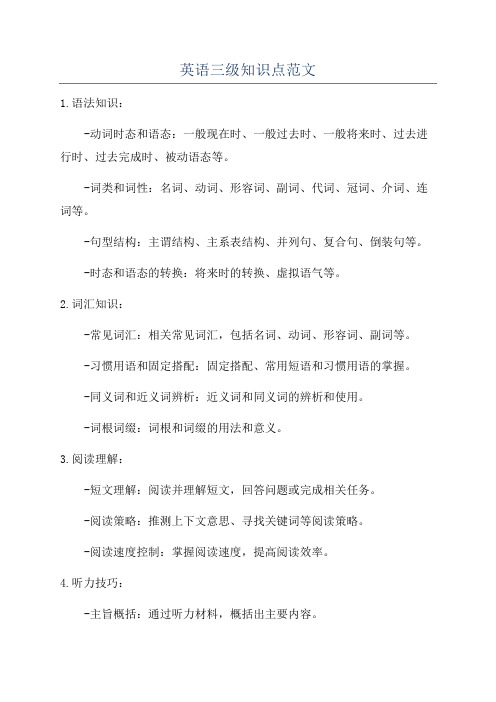
英语三级知识点范文
1.语法知识:
-动词时态和语态:一般现在时、一般过去时、一般将来时、过去进行时、过去完成时、被动语态等。
-词类和词性:名词、动词、形容词、副词、代词、冠词、介词、连词等。
-句型结构:主谓结构、主系表结构、并列句、复合句、倒装句等。
-时态和语态的转换:将来时的转换、虚拟语气等。
2.词汇知识:
-常见词汇:相关常见词汇,包括名词、动词、形容词、副词等。
-习惯用语和固定搭配:固定搭配、常用短语和习惯用语的掌握。
-同义词和近义词辨析:近义词和同义词的辨析和使用。
-词根词缀:词根和词缀的用法和意义。
3.阅读理解:
-短文理解:阅读并理解短文,回答问题或完成相关任务。
-阅读策略:推测上下文意思、寻找关键词等阅读策略。
-阅读速度控制:掌握阅读速度,提高阅读效率。
4.听力技巧:
-主旨概括:通过听力材料,概括出主要内容。
-细节理解:听取细节信息,回答相关问题。
-对话场景判断:根据对话内容,判断场景和人物关系。
-短文完形填空:根据短文内容,选择正确的选项。
5.口语表达:
-日常交际用语:问候、介绍自己、提出请求、道歉、感谢、邀请等常见交际用语。
-自我介绍:掌握简单自我介绍的表达方式。
-问答对话:回答与问题相匹配的内容,进行对话交流。
-完成任务:按要求进行任务表达,如描述图片、演讲等。
6.写作技巧:
-信件写作:写推荐信、道歉信、感谢信、邀请信等。
-短文写作:写文章、记叙文、说明文等。
-日记写作:根据给定的时间和话题,进行日记写作。
英语三级语法汇总
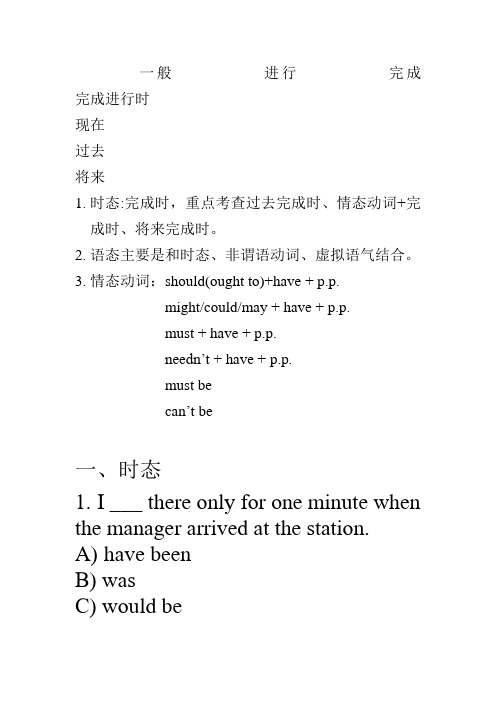
一般进行完成完成进行时现在过去将来1.时态:完成时,重点考查过去完成时、情态动词+完成时、将来完成时。
2.语态主要是和时态、非谓语动词、虚拟语气结合。
3.情态动词:should(ought to)+have + p.p.might/could/may + have + p.p.must + have + p.p.needn’t + have + p.p.must becan’t be一、时态1.I ___ there only for one minute when the manager arrived at the station.A)have beenB) wasC) would beD) had been2.By the time I got to the cinema, all the tickets for “The Merchant of Venice”____ out.A)were soldB)B) was soldC) had been soldD) have been sold3. When she arrived, I felt very bored and disappointed, because I _____ since seven o’clock.A. had waitedB) had been waitingC) were waitingD) have been waited4. My wallet is nowhere to be found. I ___when I was on the bus.A. must have dropped itB. must drop itC. should have dropped itD. have dropped it5. Just as I was leaving the house , it occurred to me that I ____to take my keys . (200406-30)A. should have forgottenB . have forgottenC. had forgottenD. must have forgotten6. They bought their first house last year , previously they _____to get a loan. (200306-21)A. were ableB. weren’t ableC. had been ableD. hadn‘t been able7. By the time we arrive in London, we___in Europe for two weeks. (200406-19)A. shall stayB. have stayedC. will have stayedD. have been staying8. Marie is very wet. She ______ in the river.A. can have fallenB. had to fallC. must have fallenD. needn’t to fall9. With all this work on hand, he ______ to the cinema last night.A. mustn’t goB. wouldn’t goC. ought to goD. shouldn’t have gone10. –Did you blame him for his carelessness?-Yes, but I _______ so.A.‘d rather not doB. shouldn’t doC. ‘d better not have doneD. shouldn’t have done11. “Did Ken take the job in the bookstore?”“No, but I think he ______.”A. will haveB. may haveC. should haveD. must have12. He _______ more than thirty.A. mustn’t beB. shouldn’t beC. won’t beD. can’t be13. You’re right. I _______ of that.A. should thinkB. should have thoughtC. must have thoughtD. needn’t think14. As we can’t get there in time, they ______ about our safety.A. should be worryingB. can be worryingC. must be worryingD. need be worrying15. I have already know about you; you ______ yourself to me.A. shouldn’t have introducedB. needn’t have introducedC. wouldn’t introduceD. mustn’t introduce16. Since my wife isn’t answering her telephone, she ________.A. must have leftB. should have leftC. can have leftD. need have left17. Since the ditch is full of water, it______ hard last night.A. ought to rainB. must have rainedC. might have rainedD. could rain18. Next month they_____ in the United States for thirty years.A. areB. have beenC. will beD. will have been19. It _______ for a week and the street were floodedA. has rainedB. had been rainingC. was rainingD. rained20. He was caught in a traffic jam and by the time he reached the airport his friend’s plane______.A. has already taken offB. had already taken offC. has been taken offD. had been taken off21. They told us that they _______ for more than two hours.A. have waitedB. were waitingC. have been waitingD. had been waiting22. It’s been a long time since I_______. How are you?A. had last seen youB. saw you lastC. have last seen youD. last was seeing you23. You needn’t hurry her. She ______ it by the time you are ready.A. will have been finishingB. will finishC. will have finishedD. will be finishing25. -“I have our tickets.”-“That’s good. I was afraid that you ______ them.”A. had forgottenB. forgotC. have forgottenD. are forgetting26. She said that she ______ soon.A. will go to collegeB. went to collegeC. would go to collegeD. won’t to go to college27. Last night he went to bed early. When we got there, he ______ to bed already.A. wentB. has goneC. had goneD. go二、非谓语动词(动名词、不定时、现在分词、过去分词<只有一种形式>)(doing/ to do/ doing/ done)(一般时、进行时、完成时)(主动、被动)1.英语中有些动词后面只能跟动名词作它的宾语。
公共英语三级语法大总结
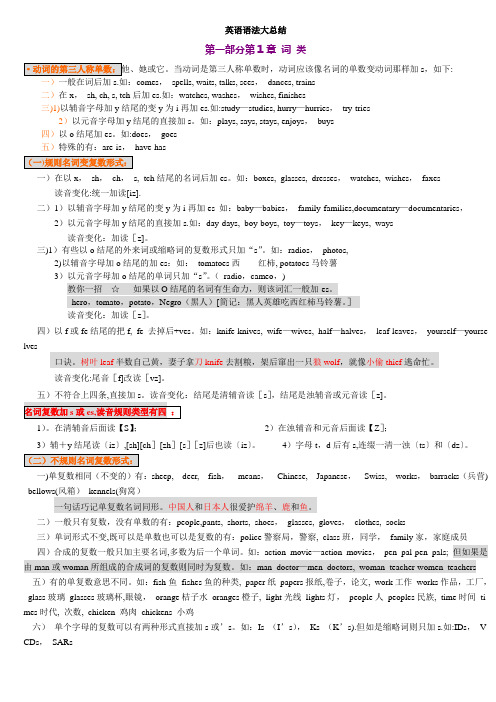
英语语法大总结第一部分第1章词类s,如下: 一)一般在词后加s.如:comes,spells, waits, talks, sees,dances, trains二)在x,sh, ch, s, tch后加es.如:watches, washes,wishes, finishes三)1)以辅音字母加y结尾的变y为i再加es.如:study—studies, hurry—hurries,try-tries2)以元音字母加y结尾的直接加s。
如:plays, says, stays, enjoys,buys四)以o结尾加es。
如:does,goes五)特殊的有:are-is,have-has一)在以x,sh,ch,s, tch结尾的名词后加es。
如:boxes, glasses, dresses,watches, wishes,faxes 读音变化:统一加读[iz].二)1)以辅音字母加y结尾的变y为i再加es 如:baby—babies,family-families,documentary—documentaries,2)以元音字母加y结尾的直接加s.如:day-days, boy-boys, toy—toys,key—keys, ways读音变化:加读[z]。
三)1)有些以o结尾的外来词或缩略词的复数形式只加“s”。
如:radios,photos,2)以辅音字母加o结尾的加es:如:tomatoes西红柿, potatoes马铃薯3)以元音字母加o结尾的单词只加“s”。
(radio,cameo,)教你一招☆如果以O结尾的名词有生命力,则该词汇一般加-es。
hero,tomato,potato,Negro(黑人)[简记:黑人英雄吃西红柿马铃薯。
]读音变化:加读[z]。
四)以f或fe结尾的把f, fe 去掉后+ves。
如:knife-knives, wife—wives, half—halves,leaf-leaves,yourself—yourse lves口诀。
公共英语三级语法大总结
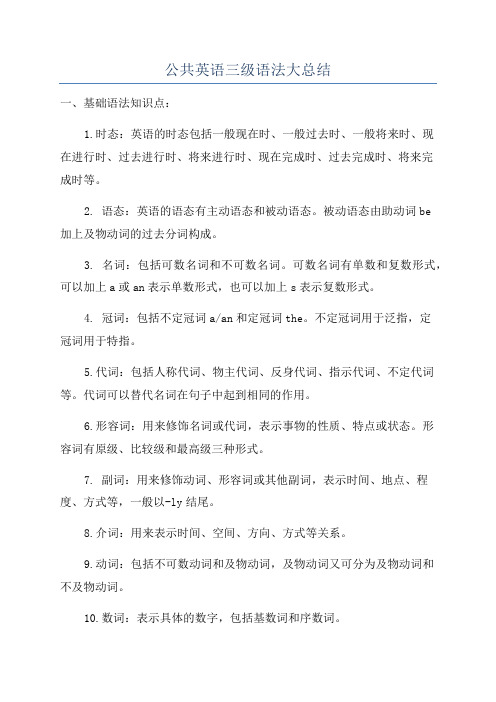
公共英语三级语法大总结一、基础语法知识点:1.时态:英语的时态包括一般现在时、一般过去时、一般将来时、现在进行时、过去进行时、将来进行时、现在完成时、过去完成时、将来完成时等。
2. 语态:英语的语态有主动语态和被动语态。
被动语态由助动词be加上及物动词的过去分词构成。
3. 名词:包括可数名词和不可数名词。
可数名词有单数和复数形式,可以加上a或an表示单数形式,也可以加上s表示复数形式。
4. 冠词:包括不定冠词a/an和定冠词the。
不定冠词用于泛指,定冠词用于特指。
5.代词:包括人称代词、物主代词、反身代词、指示代词、不定代词等。
代词可以替代名词在句子中起到相同的作用。
6.形容词:用来修饰名词或代词,表示事物的性质、特点或状态。
形容词有原级、比较级和最高级三种形式。
7. 副词:用来修饰动词、形容词或其他副词,表示时间、地点、程度、方式等,一般以-ly结尾。
8.介词:用来表示时间、空间、方向、方式等关系。
9.动词:包括不可数动词和及物动词,及物动词又可分为及物动词和不及物动词。
10.数词:表示具体的数字,包括基数词和序数词。
11.简单句:由主语和谓语构成,可以包含宾语、表语、宾语补足语等。
12.并列句:由两个或多个简单句用并列连词连接而成,表示并列关系。
13.复合句:包括主从复合句和连接复合句。
主从复合句由一个主句和一个或多个从句构成,连接复合句由两个或多个从句构成。
14.修饰语从句:修饰一个名词或代词的从句,通常由关系代词或关系副词引导。
15.定语从句:修饰一个名词或代词的从句,通常由关系代词或关系副词引导。
16.状语从句:修饰动词、形容词或副词的从句,通常由连词或连词短语引导。
17.祈使句:表示请求、命令、建议等,一般不指明主语,用动词原形开头。
18.感叹句:表示惊讶、高兴、忧虑等感叹的句子。
19.反意疑问句:用来表示征求对方的同意或确认,一般由一个陈述句和相应的疑问句组成。
二、高级语法结构:1.过去完成时:表示在过去一些时间点之前已经完成的动作或事件。
公共英语三级知识点
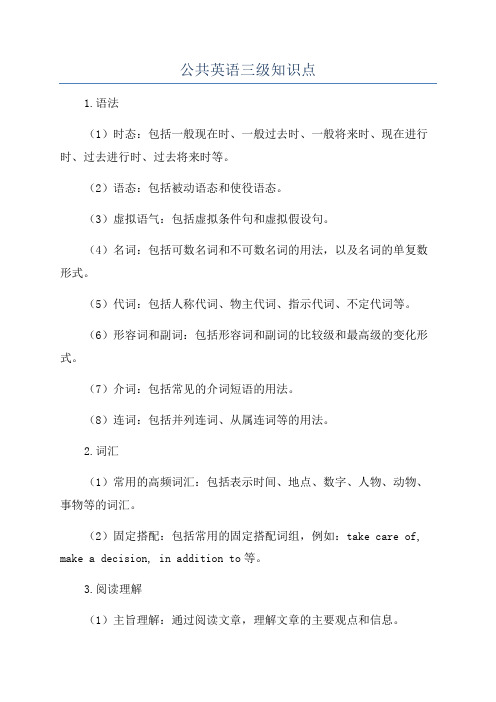
公共英语三级知识点
1.语法
(1)时态:包括一般现在时、一般过去时、一般将来时、现在进行时、过去进行时、过去将来时等。
(2)语态:包括被动语态和使役语态。
(3)虚拟语气:包括虚拟条件句和虚拟假设句。
(4)名词:包括可数名词和不可数名词的用法,以及名词的单复数形式。
(5)代词:包括人称代词、物主代词、指示代词、不定代词等。
(6)形容词和副词:包括形容词和副词的比较级和最高级的变化形式。
(7)介词:包括常见的介词短语的用法。
(8)连词:包括并列连词、从属连词等的用法。
2.词汇
(1)常用的高频词汇:包括表示时间、地点、数字、人物、动物、事物等的词汇。
(2)固定搭配:包括常用的固定搭配词组,例如:take care of, make a decision, in addition to等。
3.阅读理解
(1)主旨理解:通过阅读文章,理解文章的主要观点和信息。
(2)细节理解:通过阅读文章,寻找并理解文章中的细节信息。
(3)推理判断:通过阅读文章,运用逻辑思维推理出正确的答案。
(4)词义猜测:根据文章上下文,推测出词语的含义。
4.写作
(1)个人简介:写作自我介绍,包括姓名、年龄、职业、爱好等。
(2)描写事物:写作对人、地点、事物的描写,包括外貌特征、性格特点、场所环境等。
(3)写作推荐信:写作推荐信,包括介绍被推荐人的基本情况、能力和优势等。
公共英语等级考试pets-4考点公共英语等级考试三级PETS3学习笔记
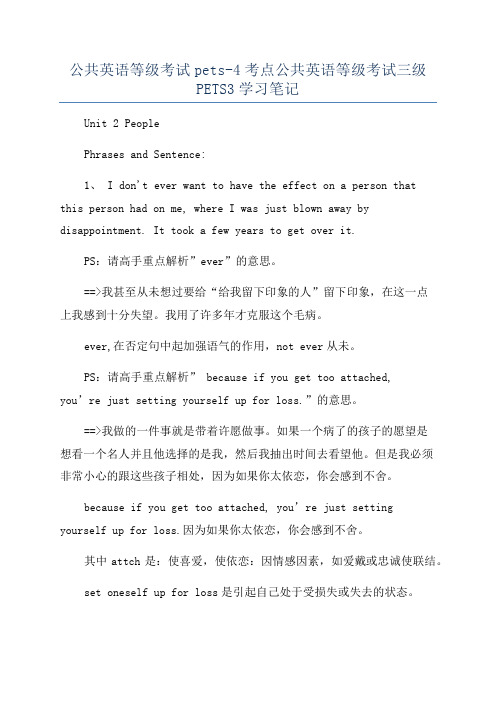
公共英语等级考试pets-4考点公共英语等级考试三级PETS3学习笔记Unit 2 PeoplePhrases and Sentence:1、 I don't ever want to have the effect on a person thatthis person had on me, where I was just blown away by disappointment. It took a few years to get over it.PS:请高手重点解析”ever”的意思。
==>我甚至从未想过要给“给我留下印象的人”留下印象,在这一点上我感到十分失望。
我用了许多年才克服这个毛病。
ever,在否定句中起加强语气的作用,not ever从未。
PS:请高手重点解析” because if you get too attached,you’re just setting yourself up for loss.”的意思。
==>我做的一件事就是带着许愿做事。
如果一个病了的孩子的愿望是想看一个名人并且他选择的是我,然后我抽出时间去看望他。
但是我必须非常小心的跟这些孩子相处,因为如果你太依恋,你会感到不舍。
because if you get too attached, you’re just settingyourself up for loss.因为如果你太依恋,你会感到不舍。
其中attch是:使喜爱,使依恋:因情感因素,如爱戴或忠诚使联结。
set oneself up for loss是引起自己处于受损失或失去的状态。
3、Thank you for giving me the inspiration to stick around, at age 50, you have to feel you’re contributing to something.PS:请高手重点解析” you have to feel you’re contributing to something.”==>谢谢你给我关于等待的启示,在50岁时,你必须感到你正在做贡献。
大学英语三级考试语法总结
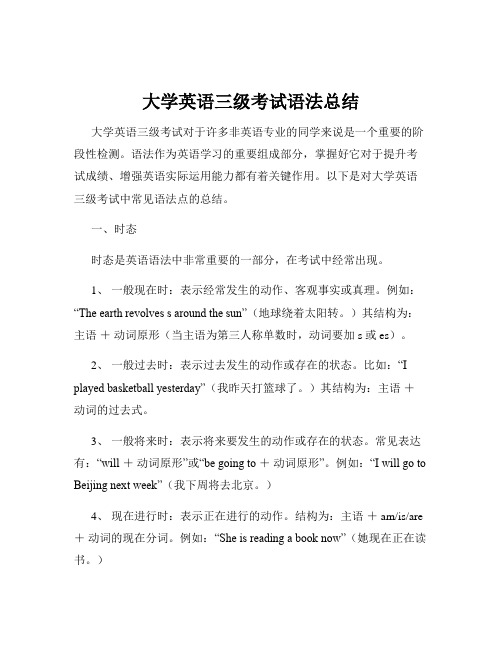
大学英语三级考试语法总结大学英语三级考试对于许多非英语专业的同学来说是一个重要的阶段性检测。
语法作为英语学习的重要组成部分,掌握好它对于提升考试成绩、增强英语实际运用能力都有着关键作用。
以下是对大学英语三级考试中常见语法点的总结。
一、时态时态是英语语法中非常重要的一部分,在考试中经常出现。
1、一般现在时:表示经常发生的动作、客观事实或真理。
例如:“The earth revolves s around the sun”(地球绕着太阳转。
)其结构为:主语+动词原形(当主语为第三人称单数时,动词要加 s 或 es)。
2、一般过去时:表示过去发生的动作或存在的状态。
比如:“I played basketball yesterday”(我昨天打篮球了。
)其结构为:主语+动词的过去式。
3、一般将来时:表示将来要发生的动作或存在的状态。
常见表达有:“will +动词原形”或“be going to +动词原形”。
例如:“I will go to Beijing next week”(我下周将去北京。
)4、现在进行时:表示正在进行的动作。
结构为:主语+ am/is/are +动词的现在分词。
例如:“She is reading a book now”(她现在正在读书。
)5、过去进行时:表示过去某个时刻正在进行的动作。
其结构为:主语+ was/were +动词的现在分词。
如:“I was watching TV at eighto'clock last night”(昨晚八点我正在看电视。
)6、现在完成时:表示过去发生的动作对现在造成的影响或结果,或者过去开始一直持续到现在的动作。
结构为:主语+ have/has +过去分词。
比如:“I have finished my homework”(我已经完成了作业。
)7、过去完成时:表示过去某个时间之前已经完成的动作。
结构为:主语+ had +过去分词。
例如:“By the end of last year, we had learned 2000 words”(到去年年底,我们已经学了 2000 个单词。
全新四川省大学英语三级考试词汇语法部分专项分析

第二部分:词汇和语法(Structure and V ocabulary)(一)考试大纲和历年试题分析根据四川省大学英语三级考试大纲,“词汇与结构”部分共20题,语法结构占60%,即12题,词汇40%,即8题。
考查的内容主要在要求的大纲语法项目和约3550个单词和350条短语之中。
就历年试题分析,考查的重点主要集中在如下项目:(二)词汇部分考点1. 形容词、副词形容词和副词为每年三级考试必考题目,所考单词全部出自考纲所要求的3550个基础词汇,主要考查学生对单词意义的准确把握,以及单词的相关搭配。
每年的考题中通常会有两道题目,一道考查形容词,另外一道考查副词。
真题演练:1)The young officer was very ______with the new soldier in their training .(200406-15)A. hardB. strictC. seriousD. hostile2)There are no tickets ______for Saturday‟s concert.(200506-26)A. preferableB. favorableC. availableD. considerable3) It is quite necessary for a qualified teacher to have good manners and _____ knowledge.A) intensive B) ineffective C) extensive D)expensive(200512-22)4) We need someone really _____ who can organize the office and make it run smoothly.(200512-26)A) effective B) efficient C) essential D) executive5)Let's hang up some nice paintings on these _____ walls of the great hall.(200512-29)A) blank B) bare C) empty D) vacant6)She is one of the newest film stars from America and has many fans, _____ in Europe. (200312-13) A) specially B) particularly C) partially D) specifically7)They took _____ measures to prevent poisonous gases from escaping in the chemical plant.A) fruitful B) beneficial C) effective D) influential(200312-16) 8)John and Edwards are, ______, the producer and director of the film that won the prize just now.A. definitelyB. relativelyC. collectivelyD. respectively(200406-13)9) It is ______ impossible to find a good educational computer program in this part of the country.A. merelyB. barelyC. hardlyD. nearly(200506-31)10) Over ten people died and twenty people were _______ wounded in the train crash.(200606-20)A. eventuallyB. urgentlyC. bitterlyD. seriously答案:1)B,2)C,3)C,4)B,5)B,6)B,7)C,8)D,9)D,10)D补充练习:1) He is not really ill, but he has a ______ headache.A. obviousB. delicateC. slightD. temporary2) Some ______ friends helped John to get a good job.A. capableB. effectiveC. efficientD. powerful3) The winds today will be light and _____.A. variedB. variousC. variableD. valuable4)She is very ______ about what she wears and eats.A. popularB. specificC. specialD. particular5) He was quite ________ about his future in the company.A. pessimisticB. optionalC. ambitiousD. confident6) Noise is unpleasant, _______ when you are trying to sleep.A. surelyB. exclusivelyC. generallyD. especially7) Free medical treatment in this country covers sickness of mind as well as ______ sicknesses.A. normalB. regularC. averageD. ordinary8) Having heard so much about Mr. Smith, they were ______ to meet and have a chat with him.A. eagerB. desperateC. urgentD. earnest9) The mild boiled over and there was a _____ smell of burning.A. horribleB. beautifulC. hostileD. bitter10) Johnny was very ______ and preferred not to talk about his achievement.A. modestB. impatientC. indifferentD. mysterious11) We had ______rain this summer.A. considerateB. considerableC. conservativeD. consistent12) Although only of ______ intelligence, he speaks four foreign languages fluently.A. averageB. middleC. minorD. slow13) ______, many workers who have been laid off are the victims of the bad management in the company.A. ScarcelyB. UndoubtedlyC. DirectlyD. Largely14) The hero in the story is an ______ character.A. imagineB. imaginaryC. imaginativeD. imagination15) The lady who had invited us heard me telling my wife that the dinner was terrible, so I was ______.A. confusedB. nervousC. shamefulD. embarrassed16. The doctor found the patient‟s blood pre ssure remained _______ at all time.A. constantB. continuousC. continualD. available17. Our public transportation is not _______ for the need of the people in our major cities.A. excessiveB. additionalC. efficientD. adequate18. –I‟d like to have a table for four at 6 o‟clock.–I am sorry. There are no tables ______ this evening.A. availableB. favorableC. readyD. prepared19. In teaching it is highly ______ to know exactly what one is hoping to achieve.A. unableB. reliableC. unreasonableD. desirable20. There were _________ 9,997 people at the opening ceremony of the games.A. approximatelyB. nearlyC. apparentlyD. exactly答案:1-5: C D C D D 6-10: D D A A A11-15: B A B D A16-20: A D A D D2.动词、动词短语动词也是每年三级考试必考题目,所考单词全部出自考纲所要求的3550个基础词汇,即有单独考查单词意义的题目,也有考查动词意义及其搭配的题目,复习时应该注意动词的相关搭配和用法。
新英语三级考试常考知识点

新英语三级考试常考知识点1. Grammar: Present simple and continuous tenses, past simple and continuous tenses, future forms (will, going to, present continuous), present perfect and past perfect tenses, modal verbs, passive voice, conditionals (zero, first, second, third), reported speech, comparative and superlative forms, adverbs and adjectives, articles, pronouns, prepositions.2. Vocabulary: Synonyms, antonyms, homonyms, idioms, collocations, word formation (prefixes, suffixes), phrasal verbs, expressions with prepositions, compound words.3. Reading: Reading comprehension, understanding main ideas, understanding details, understanding inferred meaning, understanding factual information, understanding opinions and attitudes, understanding text organization (paragraphs, headings), understanding writer's purpose.4. Writing: Writing an essay, writing a letter, writing a report, writing a short story, writing a summary, writing a description, writing an argument, writing a review.5. Listening: Listening for general understanding, listening for specific information, listening for inferred meaning, listening for opinions and attitudes, listening for factual information, listening for the main idea, listening for details.6. Speaking: Answering questions, giving opinions, expressing agreement and disagreement, making suggestions, asking for clarification, describing people and places, talking about pastexperiences, talking about future plans, giving reasons and examples, comparing and contrasting.。
- 1、下载文档前请自行甄别文档内容的完整性,平台不提供额外的编辑、内容补充、找答案等附加服务。
- 2、"仅部分预览"的文档,不可在线预览部分如存在完整性等问题,可反馈申请退款(可完整预览的文档不适用该条件!)。
- 3、如文档侵犯您的权益,请联系客服反馈,我们会尽快为您处理(人工客服工作时间:9:00-18:30)。
• would rather+从句,是一个常用的虚拟语 气句型 Would rather+从句,谓语一般用过去 时来表示现在或将来。其意为“宁愿……, 还是…… 好些”“一个人宁愿另一个人做 某事”。引导从句的that常省略。在谈到过 去的动作时,谓语则用过去完成时。
• John wants to see me today. I would rather he came to tomorrow than today. 约 翰今天想去看我。我宁愿他明天来看我而 不是今天。(句中came不是表示过去而是表 示将来)
公共英语三级
• PETS 第三级考试由笔试试卷和口试试卷组 成。 • 笔试试卷(120分钟)分四部分:听力、英 语知识运用、阅读理解和写作。 • 口试试卷(10分钟)分三节考查考生的口 语交际能力。 • 笔试试卷和口试试卷都使用英文指导语。
• (一)听力 • 该部分由A、B两节组成,考查考生理解英 语口语的能力。
• So long as 只要 条件 • You may borrow the book so long as you keep it clean.
• “would rather...than...”句式,意思是 “宁愿……而不愿……”,表示主观愿望, 即在两者之中选择其一。would…rather than… • She‘d rather die than lose the children. 她宁愿死也不愿失去孩子们。 • I would rather watch TV at home than go to the cinema.
三级公共英语语法重点
• 1谓语动词与主语一致。Together with, with, • Along with, as well as, rather than • The captain, as well as the other players, was tired. • John, along with his brothers, is going to a dinner party tonight.
• (四)写作 • 该部分由A、B两节组成,考查考生的书面表达能力。 • A节:考生根据所给情景(英/中文)写出约100词(不计 算标点符号)的简单信件、便笺等。 • B节:考生根据所给情景,写出一篇不少于120词(不计 算标点符号)的文章。提供情景的形式有图画、图表、文 字等。 • 该部分所需时间约为40分钟。考生在答题卡2上作答。
• No sooner …than 刚一…就 • We had no sooner sat down than we found it was time to go. • No sooner had we sat down than we found it was time to go.
• Now that : since • Now that you are grown up, you must stop this childish behavior. • So… as 像…一样 否定句 • This room is not so large as that one. • So far as 就… • So far as I know, he will be away for three weeks.
Hale Waihona Puke • • • • • • • • •
I wish that 从句主语 + were Did Would Could Had done I wish I were as tall as you. 我希望和你一样高。 (had + 过去分词)
• order, suggest, propose, require, demand, request, insist, command, insist + (should) do
• (二)英语知识运用 • 该部分考查考生对语法结构、词汇知识和表达方 式的掌握情况。 • 共20小题。在一篇200-250词的短文中留出20个 空白,要求考生从每题所给的4个选择项中选出最 佳选项,使补足后的短文意思通顺、前后连贯、 结构完整。其中有13-15道题考查词汇和表达方 式,5-7道题考查语法结构。 • 该部分所需时间约为15分钟。考生在答题卡1上 作答。
• A节(10题):考查考生理解事实性信息的 能力。要求考生根据所听到的10段简短对 话,从每题所给的4个选择项中选出最佳选 项。每题有15秒答题时间 (5秒用作听前读 题,10秒用作听后答题)。
• B节(15题):考查考生理解总体和特定信 息的能力。要求考生根据所听到的4段对话 或独白,从每题所给的4个选择项中选出最 佳选项。每题有20秒答题时间,每段录音 材料只播放一遍。问题不在录音中播放, 仅在试卷上印出。 • 听力考试进行时,考生将答案标在试卷上; 听力部分结束后,考生有三分钟的时间将 试卷上的答案转涂到答题卡1上。该部分所 需时间约为25分钟(含转涂时间)。
• (五)口试 • 口试分A、B、C三节,测试考生用英语进行口头交际的能力。 • 每次口试采取两名口试教师和两名考生的形式。一名口试教师不参与 交谈,专事评分;另一名主持口试,随时与考生交谈并评分。专事评 分的教师所给分数的权重占考生口试成绩的三分之二,主持口试的教 师所给分数的权重占考生口试成绩的三分之一。 • A节:考查考生提供个人信息、回答有关他们日常生活、家乡、家庭、 工作、学习等问题的能力。该节约需3分钟时间。 • B节:考查考生就信息卡上的图片或文字讨论有关问题的能力。该节 约需3分钟时间。 • C节:要求考生就信息卡上的图片或文字作简短描述,之后另一考生 就同一话题阐述个人观点。该节约需4分钟时间。
Either… or 和neither… nor 作主语的结构中, 动词的单复数取决于or或nor后面的名词单 复数。 如:Either my father or my brothers are coming.
• 从属连词 • as if /as though 好像 • You look as if /as though you are going to cry. • as 以… 方式 • He did it as I had told him. • You can go out as long as you promise to be back before 11 o’clock.
• suggestion, proposal, idea, plan, order, advice等名词后面的表语从句、同位语从句 中要用虚拟语气,即(should)+动词原形。
• It is demanded / necessary / a pity + that… 结构中的主语从句的谓语动词要用should 加动词原形, should 可省略。
There be 主谓一致
• Be 的单复数通常取决于紧跟其后的名词单 复数。 • There is a book, two pens and three pencils on the desk.
Not only… + 名词+but also +名词
• Not only… + 名词+but also +名词作主语的 结构中,谓语动词与but also 后的名词的数 保持一致。 • Not only his wife but also his children have arrived.
• Even if / even though 即使 • Even if they offered to pay, we wouldn’t accept any money from them. • Hardly… when 刚一…就 • I had hardly got home, when it began to rain. • Hardly had I got home, when it began to rains.
• (三)阅读理解 • 该部分由A、B两节组成,考查考生理解书面英语的能力。 • A节(15题):考查考生理解总体和特定信息的能力。要求 考生根据所提供的3篇文章的内容(平均长度为350词左右) 从每题所给的4个选择项中选出最佳选项。 • B节(5题):考查考生理解文章(约长350词)的主旨要 义的能力。考生须从七个选项中排除两个干扰项,将正确 的概述与五段文字逐一搭配成对。 • 该部分所需时间约为40分钟。考生在答题卡1上作答。
